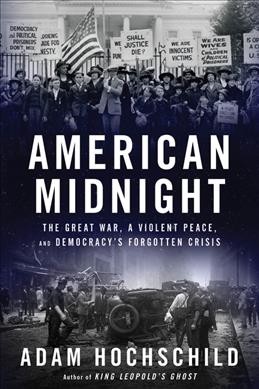Adam Hochschild is not known for writing light books, nor is he known for writing about the Pacific Northwest. His best-known book is probably King Leopold’s Ghost (1998), an unrelenting exploration of the brutality, exploitation and outright slavery Belgian overlords used to extract rubber from what was then called the Belgian Congo (now the Democratic Republic of the Congo).
That’s about as far from Washington, Oregon and Idaho as you can get.
But Hochschild’s new book, American Midnight, is set in the United States, in the years 1917-1921, when America’s entry into World War I set off some of the most brutal and repressive government and vigilante actions in this country’s history. And it contains numerous examples of courage and hope, many from the Northwest.

Subtitling his book “The Great War, a Violent Peace, and Democracy’s Forgotten Crisis,” Hochschild explores the ways Woodrow Wilson’s administration and the country’s reactionary elements used the war to go after anyone who didn’t support their jingoist enterprise or the corporate entities and plutocrats who made money off it.
The resulting terror–aimed at Socialists, labor leaders, peace advocates, conscientious objectors, and, most brutally, African Americans–brought democracy to its knees. But a number of brave advocates for the common people resisted the violent coercion, often at the cost of their livelihoods, their health and even their lives.
Any Northwesterner who believes in progressive politics–including the advancement of worker rights, a woman’s right to control of her own body, fair taxation, alleviation of poverty, and even the basic right of freedom from arbitrary search and seizure–will find plenty in Hochschild’s book to feel proud of.

There’s Marie Equi, for example, a Portland physician and suffragist, who was in a same-sex relationship at a time when that was far more dangerous than it is today. A brash woman with a fiery temper, Equi “ignored the law that outlawed distributing birth control devices and information, and defied both the government and the American Medical Association by performing abortions,” treating poor women for free.
Once, to avoid arrest for speaking out against the war, Equi “borrowed the crampons of a telephone company lineman, and used them to climb high up a pole. From there, she unfurled a banner reading DOWN WITH THE IMPERIALIST WAR.”
There are also the leaders of the Seattle General Strike, which, in 1919 shut down an entire city for the first time in American history, but did so in an orderly way that avoided bloodshed and undue hardship for most citizens.

And there’s the International Workers of the World labor union, which was particularly strong in the Northwest. The Wobblies, as they were called, were singled out again and again for the harshest treatment. The union suffered destruction of its property, arrest of its members, and sometimes death at the hands of those who thought it a haven for foreign-controlled socialism (including members of the American Legion).
At a time when almost 15% of Americans were foreign-born, much of harshest treatment was meted out to immigrants, who had flooded into the Northwest in those days to work in the timber, mining, and fishing industries.
To be fair, the Northwest had its share of villains too. One of the worst, in Hochschild’s estimation, was a Congressman from the coastal timber country in Washington State named Albert Johnson, who sat on the House Committee on Immigration and Naturalization and was vicious in his denunciation and harassment of immigrants.

Another was Ole Hanson, Seattle’s mayor at the time of the General Strike, who blamed not only the strike but everything he thought wrong with America on Socialist and Communists. Hanson went on lucrative speaking tours around the country, spewing his hatred to all who would listen, and even ran for President with anti-immigrant and anti-socialism as his platform.
According to Hochschild, vociferous denunciation of the Seattle strikers as advocates for the “anarchy of Russia” and enemies of law and order “launched Hanson as perhaps the first member of an occupation that would prove lucrative for other twentieth-century Americans: professional anti-Communist.”
American Midnight is primarily about a country in a life-or-death crisis, its democracy threatened by warmongering, government oppression, hunger for profits, vigilante “justice,” white supremacy, and a misguided defense of some supposed American Way of Life.
Sprinkled throughout it, however, you’ll find ample evidence of a previously neglected part of the country coming into its own and lending its voice, for better or worse, to the national conversation: the Pacific Northwest.
Other links:
Video: Oregon Public Broadcasting “Oregon Experience” profile of Marie Equi (3:40)
Marie Equi: Radical Politics and Outlaw Passions by Michael Helquist, OSU Press
Video: “The Wobblies” (1:43)
International Workers of the World (Wobblies)–IWW History Project, University of Washington
Seattle General Strike Project, with video introduction (3:47), University of Washington
Woodrow Wilson and Race (& Immigration), President Wilson House
“U. S. Participation in the Great War (World War I),” Library of Congress
Washington State Congressman Albert Johnson
Seattle Mayor Ole Hanson, Historylink.org
Note: I am an affiliate of Bookshop.org, where your purchases support local bookstores. If you purchase a book through a click on this website, I will earn a small commission that helps defray the costs of maintaining WritingtheNorthwest.com.

Leave a Reply